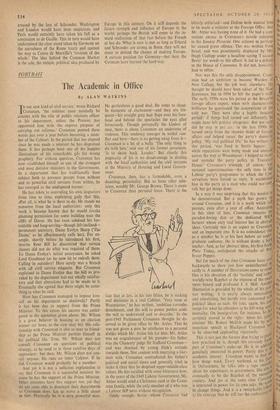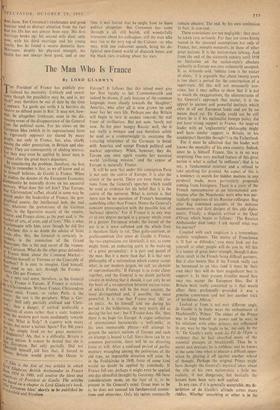PORTRAIT
The Academic in Office
By ALAN WATKINS
`TN our new kind of civil service,' wrote Richard 1Crossman, 'the minister must normally be content with the role of public relations officer to his department, unless the Premier has appointed him with the express purpose of carrying out reforms.' Crossman penned these words just over a year before becoming a mem- ber of the Cabinet. In the period that has elapsed since he was made a minister he has disproved them. It has perhaps been one of the happier, illustrations of his remarkable gift for wrong prophecy. For without question, Crossman has now established himself as one of the strongest and most decisive ministers in the Government. In a department that has traditionally been subject both to pressure groups from without and to powerful civil servants from within, he has emerged as the undisputed master.
He has taken to overruling his own inspectors from time to time, explaining gaily that this, after all, is what he is there to do. He stands no nonsense from the local authorities: only this week it became known that he would revoke planning permission for some building near the cliffs of Dover. He has even subdued his for- midable and long-serving--though left-inclined- permanent secretary, Dame Evelyn Sharp (The Dame,' as he affectionately calls her). For ex- ample, shortly before he introduced his first, interim Rent Bill he discovered that certain clauses did not do what was required of them. To Dame Evelyn's initial annoyance, he asked Lord Goodman (as he now is) to redraft them. Calling in outsiders! Here surely was a breach with all civil service etiquette. But Crossman explained to Dame Evelyn that the bill as pro- vided by the department was not wholly satisfac- tory and that alterations had to be made in it. Eventually she agreed that there might be some- thing in what he said.
How has Crossman managed to impose him- self on his department so decisively? Partly it has been due to support from the Prime Minister. To this extent his success was antici- pated in the quotation given above. Mr. Wilson is a great believer in housing as an election winner (or loser, as the case may be). His rela- tionship with Crossman is also as near to friend- ship as the Prime Minister permits himself in his political life. True, Mr. Wilson does not consult Crossman on questions of political strategy, as he used to in those carefree days of opposition: but then, Mr. Wilson does not con- sult anyone. He runs no inner Cabinet. If he did, Crossman would probably be a member.
And yet it is not a sufficient explanation to say that Crossman is a successful minister be- cause he has the support of the Prime Minister. Other ministers have this support too, yet they do not seem able to dominate their departments as Crossman does. Let us move a little closer to him. Physically he is a very powerful man.
He gesticulates a good deal. He tends to shout. In moments of excitement—and they are fre- quent—his straight grey hair flops over his fore- head and behind the spectacles the eyes glint ferociously. Though personally the kindest of men, there is about Grossman an undertone of violence. This tendency emerges in verbal con- flict and here—there is no getting away from it- Crossman is a bit of a bully. 'The only thing to do with him,' said one of his former associates, 'is to shout back. Louder.' But clearly this pugnacity of his is no disadvantage in dealing with the local authorities and the civil servants at the Ministry of Housing and Local Govern- ment.
Crossman, then, has a formidable, even a daunting, personality. But so have other min- isters, notably Mr. George Brown. There is more to Crossman than personal force. There is the fact that at last, in his late fifties, he is making real decisions in a real Cabinet. 'Very soon at Westminster,' he has written, `ambition corrodes detachment, and the will to power pushes aside the will to understand and to describe.' In the post-1945 Parliament Crossman thought he de- served to be given office by Mr. Attlee. That he was not given a post he attributes to a personal dislike which Mr. Attlee felt for him. Mr. Attlee was an acquaintance of his parents—his father was the Chancery judge Sir Stafford Crossman- and was shocked by young Dick's attitude towards them. Not content with marrying a Ger- man wife, Crossman contradicted his father's political and social views and generally tried to make it clear that he despised upper-middle-class values. He has recalled with some bitterness how, in the years of the 1945 Labour Government, Mr. Attlee would send a Christmas card to the Cross- man family, while the only member of it who was a Labour MP went without recognition.
Oddly enough, Bevin--whom Crossman had
bitterly criticised—and Dalton both wanted him to be made a minister at the Foreign Office. But Mr. Attlee was having none of it. He had a con- venient excuse in Crossman's hostile columns in the Sunday Pictorial. One column in particu- lar caused grave offence. This was written from Israel, and was prominently displayed by Mr. Hugh Cudlipp under a headline saying 'I accuse Bevin' (or words to this effect). It led to a debate in the House of Commons. It did not, however, lead to office.
Nor was this the only disappointment. Cross- man had an ambition to become Warden of New College, but the job went elsewhere. He thought he should have been editor of the New Statesman, but in 1954 he left the paper's staff. The early 1950s were his period as the Bevanite foreign affairs expert, when with characteristic brilliance he questioned the assumptions of the cold war. They were also a highly insecure period: if things had turned out differently he might have left politics altogether. But not only did he stay in pol..ics: in the late 1950s he turned away from the showier fields of foreign affairs and helped recast the party's domestic policy. 'My real political life,' he has written ‘'f this period, 'was lived in Smith Square . while reputations were being made and unmade across the way at Westminster, I helped to mate and unmake the party policy in Transport House.' Crossman's triumph, of course, \‘'.0 national superannuation—the only item in the Labour party's programme to which the Coil' servatives were forced to reply. It establis14 him in the party as a man who could not onlY talk but get things done.
In a way it was surprising that this needed !0 be demonstrated. But a myth has grown LIP around Crossman, and it is a myth which still persists, even after a year of office. According to this view of him, Crossman remains the paradox-loving don or the dedicated WEll lecturer whose only real interest lies in abstr.ict ideas. Certainly this is an aspect to Crossni.111' and an importantone. It is no coincidence that as a speaker he is at his best before an under graduate audience. He is without doubt a bori/ teacher. And, as for abstract ideas, his first bot4' Plato Today, anticipated the attacks of pro' lessor Popper. But for much of the time Crossman leans o'er backwards to show just how unintellectual 11,e really is. A number of illustrations come to inioe; One is his elevation of the 'realistic' and rather worldly-wise Bagehot at the expense of the iu'ii more, honest and profound J. S. Mill. Anotl'te.r, illustration is provided by the whole of his P"', war writing: it is nearly always entertairlinti and stimulating, but hardly ever Concerned ‘N't political ideas as such. Or take, again, his el: tempt for what he considers to be left-wing send' mentality. On immigration, for instance, he 11:r certainly moved to the right: when his juni°0, minister Mr. Robert Mellish made his by 011, notorious speech at Blackpool Crossman ‘'` to be observed applauding vigorously.
This is not just the former don trying to pl" a how practical he is, though this certainly for111„ al,, part of Crossman's make-up. He is in addall'" it I about his experiences in government. His 01,1i Jim eventually to be the Bagehot of the Waffle', oh. century. And yet at the same time Cros,01's 0,1 is interested in power for its own sake. He ■011;e to ch. ange things. And it is a remarkable Irib1;; It to his courage that he still has the enthusi"'''' 11 genuinely interested in power. Partly this t!' st academic interest: Crossman wants to 110 (),1,1 how things work. Every weekend, at his I:11,4 in Oxfordshire, he talks into a tape. rectgu'is does have. For Crossman's exuberance and good humour tend to distract attention from the fact that his life has not always been easy. His first marriage broke up; his second wife died; only now, with his third marriage and his young family, has he found a secure domestic base. Moreover, despite his physical strength, his health has not always been good, and at one
time it was feared that he might have to leave politics altogether. But Crossman has come through it all, still boyish, still wonderfully irreverent about his colleagues, still the man who may rise to the very top of the Cabinet—or who may. with one indiscreet speech, bring his de- lightful new-found world of dispatch boxes and big black cars crashing about his ears.







































 Previous page
Previous page